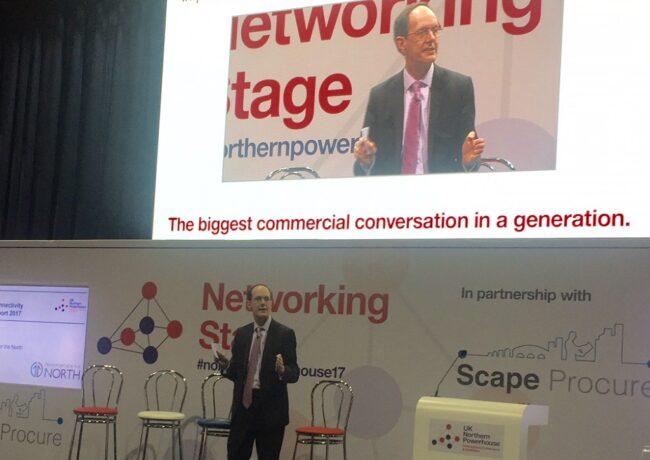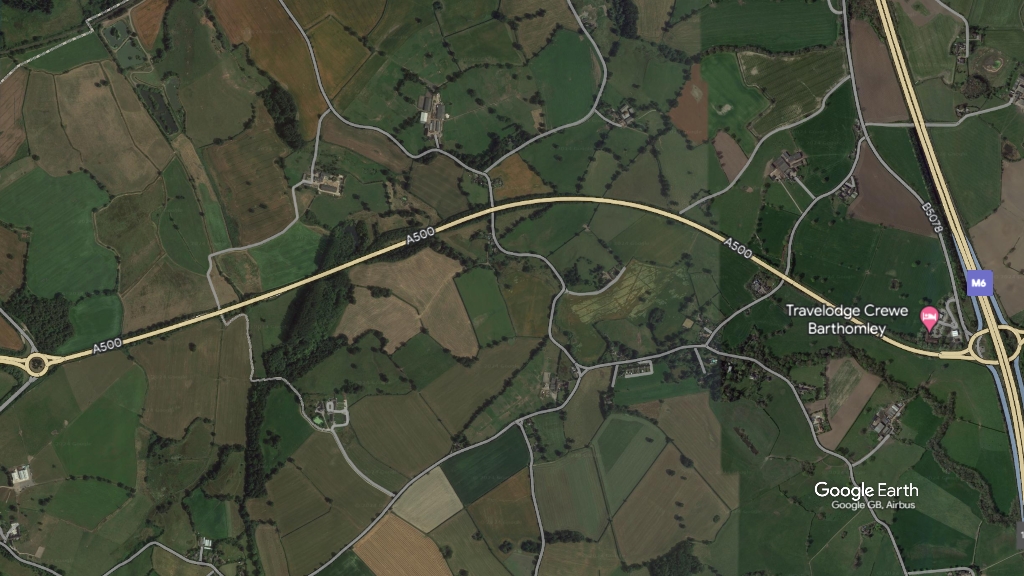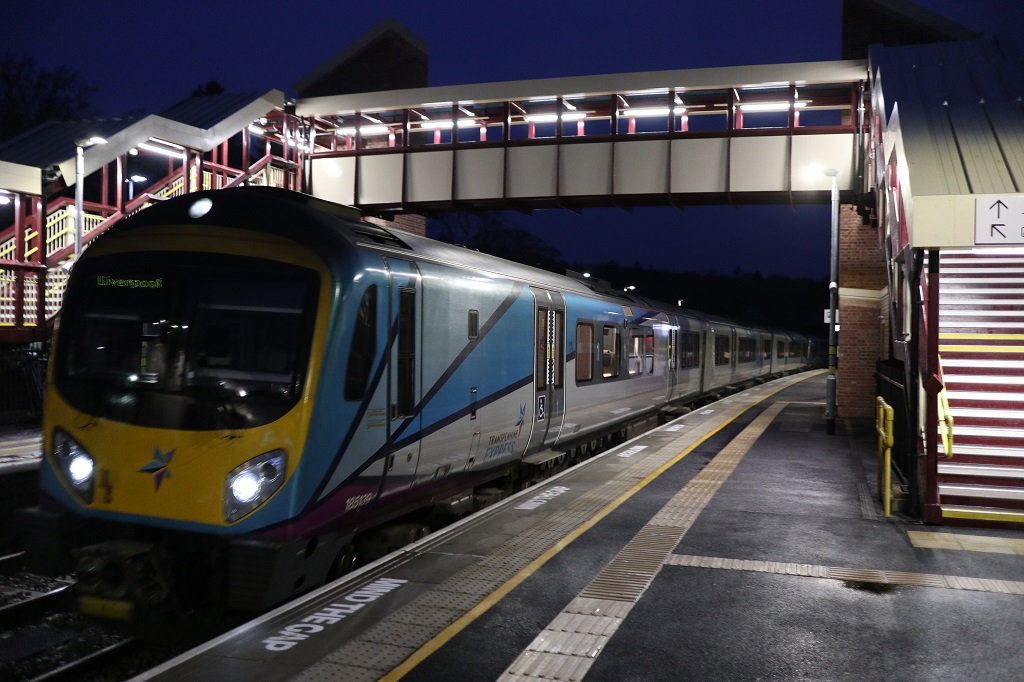Cridland: Transport investment will return dynamism to the North
Transport for the North is close to making “specific recommendations” to Government on how to achieve better outcomes for road and rail connectivity across the North, according to TfN chairman John Cridland.
The Northern transport body is weeks away from delivering a report to Government, looking at how to progress with major rail improvements, including HS3 and Northern Powerhouse rail, and road initiatives such as the TransPennine tunnel.
Cridland presented at the Northern Powerhouse conference held in Manchester yesterday, where he took to the stand to promote TfN’s vision to use transport to “return to the dynamism and growth we had in the North in the 17th-century.”
Speaking to Place North West, Cridland outlined how TfN planned to convince policymakers to increase investment in Northern connectivity.
“We identified at the beginning of the TfN journey some key specifications to get Northern connectivity to the standard that it needs to be. The investment required to get to those outcomes is varied. It could be about updating existing rail, or sometimes the only way to achieve the goals could be entirely new rail.
“What you are going to see in the coming weeks and months is quite specific recommendations to achieve each of those outcomes, as near as possible, and which of them will give the best return on investment,” he said.
“On the road side this includes three big strategic studies; on the North West quadrant of the M60, the TransPennine tunnel, and proposals for better East-West connectivity with improvements to the A66 or A69. Feasibility proposals are being drawn up for each of them, and we will report on those in the coming weeks and months.”
Speaking earlier at the conference was Northern Powerhouse minister Andrew Percy. When grilled on plans for improving Northern transport, he repeatedly said he was “awaiting recommendations from TfN”. With the Government visibly shifting responsibility to TfN, was there a risk devolution could turn to scapegoating if proposals don’t prove popular?
“The Government is recognising that the North and Northern leaders need to come up with these proposals themselves,” Cridland responded. “The decisions used to be worked up in London, which is a long way away from the North. We’re much more likely to get these proposals right if they’re actually developed in the North.
“My job is to make the investment case, then it’s clearly the job of ministers to weigh it up from a Treasury point of view as there’s only so much capital to go around.”
A recent report by the Institute for Public Policy Research highlighted the increasing gap in spending on infrastructure per head in London and the North, with £1,943 per person expected in the capital, compared to £682 per person in the North West, and £190 in Yorkshire.
With each region clamouring to get schemes prioritised in the face of such discrepancy, as TfN chairman Cridland is tasked with ensuring a level playing field across the North.
“We have to the look at the proposals using a ‘one North’ perspective, looking through a ‘one North’ lens, to get the greatest return on investment,” he said. “We can’t just spread the jam thinly, that would simply lead to a dissipation of impact.”
“Not every project can go ahead,” he admitted. “There is more that we would like to do than there will be public or private capital to invest in. We need to get Northern leaders to sign up to proposals which will get the greatest return on investment. Ultimately it has to be meaningful to as many Northern citizens as possible.”





He says as a £3bn 2 mile extension of the Bakerlooo Line starts being dug.
Clearly gearing up to leave Liverpool out in the cold as per usual, while the money gets spent on Manchester as per usual.
Seems a bold asserting that transport spending will return dynamism to the north. Excluding anything that TFN deems worthy, the billions of Pounds already spent or pending for Manchester’s Piccadilly, Victoria, Oxford Road and Salford Central, Metrolink initial phase plus Metrolink phases 1 to 3, the latest Metrolink to the trafford centre, the M60 itself, the money gained for the Oxford Road corridor works, the works to the M6 that throttled traffic to Liverpool while boosting capacity for Manchester, the continuing flurry of train services being gifted to Manchester Airport while the city next door fights for just 3 trains a day to Scotland’s biggest city, and Manchester being granted HS2 services and development second only to London, all this obviously can’t have had that much of a beneficial impact so far… judging by the apparent remaining lack of dynamism in the north that now supposedly requires a monster tunnel under the Pennines to dubious rationale, even more motorway works and who knows what extra railway investment into Manchester.
If £160 per head is spent on transport in Yorkshire, I would love to know what the split is between Manchester and elsewhere of that £682 per person in the North West.
Here’s a thought: instead of giving a dollop of jam to Manchester and trotting out a tired line about spreading it too thinly, how about spending a modest sum in the low billions and investing it in a city that can actually provide decent returns, and which doesn’t point to a future where vast swathes of it are unemployed or commuting 40 miles each day.
By Mike
Recommendations? What pray tell are they? So we wait another 20 years for HS3 to start.We still drive around on overpriced dirty buses,fleeced by the companies who operate them. We then see Crossrail 2 up and running before a rabbit hole is dug between Manchester and Sheffield. What a complete joke.Investment needs to be happening now.Recommendations aren’t what we want,a bit of respect from Westminster would be a start. Can we please have a fast train between Liverpool,Manchester,Manchester Airport and Leeds.Is it too much to ask in the 5th biggest economy in the world that we have proper trains linking three of our major cities?
By Elephant
As every authority in the north has an stake and influence in TfN, I look forward to hearing their recommendations.
As usual with these things, investments will be made on a return on investment basis rather than a sense of entitlement derived from the corrupted economics of the british empire.
By Doris